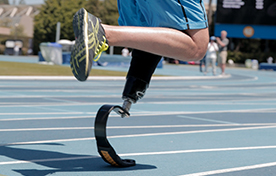In a class action lawsuit brought by amputee attorney Conal Doyle, the federal district court granted class certification, finding that United Healthcare engaged in nationwide common claims handling practices that can be challenged on a class wide basis. The lawsuit challenged United’s practice of denying covered prosthetic component parts, and failing to inform amputee patients that an alternative prosthetic device would be approved when denying claims. A trial on the merits of the case, that is, whether United’s claims practices are unlawful, is scheduled for April 2019. The lawsuit seeks to reform United’s claims practices and to require a re-processing of denied claims during the past six years.
Author: madmin
Blue Shield Sued for Failure to Provide Proper Prostheses for Activities of Daily Living
Blue Shield of California was recently sued for failing to provide certain types of artificial limbs to its members suffering from limb loss. Two of its members sued the company for its failure to properly compensate for artificial limbs.
The company’s written guidelines on coverage provided that “benefits are provided for Prostheses for Activities of Daily Living at the most cost-effective level of care that is consistent with professionally recognized standards of practice.” However, the company has refused to pay for microprocessor-controlled prostheses. It claims that the limbs are investigational, although there have been studies showing that the devices provide significant benefits over mechanical feet.
In addition, there is a significant amount of evidence that microprocessor-controlled limbs are effective. The limbs respond to constant feedback from sensors to the device’s computer, which changes the foot based on walking speed, incline, decline, and type of terrain. They allow for a more normal bend at the ankle when walking so that there is a reduction in toe drag, as well as better balance. This can help reduce falls and create better stability.
If you suffer from limb loss and your insurance company has refused to provide you with the proper limb, call me, Conal Doyle, Los Angeles personal injury attorney, at 310-651-8272. I am currently working on three lawsuits against insurance companies and would be happy to talk to you. Call today to learn more or to schedule a free consultation.
Microprocessor-Controlled Artificial Knees Considered Standard in the Medical Community
A lawsuit was recently filed against Anthem, a health insurance company that operates in several states. The lawsuit was filed by two customers of Anthem who have suffered from limb loss. The lawsuit alleges that Anthem did not properly cover the customers’ artificial limbs.
The lawsuit alleges specifically that Anthem refuses to pay for microprocessor-controlled knees. Microprocessor-controlled knees feature a microprocessor, sensors, software, a resistance system, and a battery. The knee also has internal fluid. The microprocessor monitors each phase of a person’s gait cycle using a series of sensors, which detect and monitor changes in the environment. Based on the feedback, the microprocessor adjusts resistance to the knee, which enhances stability and security, decreases the number of stumbles and falls, and provides improved ambulation.
The lawsuit alleges that microprocessor-controlled knees are now considered standard in the industry. They are used primarily for normal activities of daily living and are necessary for amputees of almost every demographic. However, Anthem has ignored medical studies and claims that the knees are considered investigational and not medically necessary.
Lawsuits are ongoing against Anthem as well as other insurance companies which have failed to provide their customers with the proper artificial limbs. If you suffer from limb loss and your insurance company has refused to pay for your artificial limb, call me, Conal Doyle, Los Angeles personal injury attorney at 310-651-8272. I can help. Call today to learn more or to schedule a free consultation.
I’m an amputee. What should I do to make TSA screening easier during the busy holiday travel season?
I am also an amputee, as well as a personal injury attorney in California. According to experts, one of the best things an amputee can do to make the security process go more smoothly, especially during the holidays, is to give yourself plenty of time. Travelers should arrive at least two hours early for domestic flights and three hours early for international flights, so that there is plenty of time to get through the security screening.
The TSA’s website (tsa.gov) has a wealth of information about TSA screening procedures. There is a number to call for questions, and a list of frequently asked questions that may help. You can also download a special card that will discreetly notify a TSA officer of a disability or medical condition that may affect the screening – however, you still must be screened before boarding the plane.
If you travel fairly regularly, you may consider enrolling in TSA’s precheck program. Members of the program go through a security check in advance, submit paperwork, and pay a fee, but once they are in the program they do not have to remove shoes, laptops, liquids, belts, or jackets during the screening process at the airport. If you travel with a companion, the companion must also have enrolled in the precheck program in order to accompany you.
As an amputee, I understand how frustrating dealing with airports and security checkpoints can be for some amputees. If you believe that your legal rights as an amputee have been violated, you should call an attorney. Call me, Conal Doyle, Amputation Attorney, at 310-651-8272. I can help. Call today to learn more or to schedule a free consultation on your case.
My loved one had an amputation in prison after he was not correctly diagnosed and treated. What are my legal options?
I’m sorry to hear about your loved one’s treatment in prison. Just because a person is in prison does not mean that they lose the right to proper medical treatment. When a prisoner is ill or suffers an injury, they deserve the same medical treatment as any other individual, and if they do not receive it the negligent parties can be held liable.
If a prisoner receives improper medical treatment, the law recognizes several possible causes of action. First, prisoners are protected under the Constitution from cruel and unusual treatment. Normally, in order to win on a claim of cruel and unusual treatment, prisoners must show that actions were taken or not taken, that were sufficiently harmful to show a deliberate indifference to serious medical needs. In other words, it must be shown that prison guards or prison doctors intentionally denied or delayed access to medical care, or intentionally interfered with treatment.
Prisoners can also bring medical malpractice claims in court against the prison or the prison doctor. This often requires expert witnesses who can review the medical care given and determine if it was appropriate. In some cases, it may be necessary to file an administrative complaint before the case goes to court.
If you or a loved one has become an amputee because of medical malpractice, call me, Conal Doyle, Amputation Attorney Conal Doyle at 310-385-0567. Call today to learn more or to schedule a free consultation.
I am having a lot of issues with my leg and it may need to be amputated. Should I keep trying to save it or have it amputated right away?
I am not a medical doctor and am not qualified to give medical advice, although I am an amputee. Making decisions about when to stop saving a limb can be extremely difficult. There is always the hope that the limb can possibly be salvaged and the fear about living the rest of your life as an amputee.
A study from the VA and the Naval Health Research Center looked at a group of wartime amputees. They examined the medical records of 625 troops with severe lower limb injuries between 2001 and 2008. The study found that the group who had their legs amputated right away seemed to do better than those who waited or who had reconstructive surgery. The study found that those vets had lower rates of infection as well as post-traumatic stress disorder.
The study does not examine the reasons why people who have their legs amputated right away do best, although experts say that those veterans may have psychological benefits, including a certain outcome and not being forced to wait for a decision. However, the study did find that all amputees had a relatively high level of PTSD.
If you are possibly facing an amputation, talk with your doctor about your options for saving your limb, and get a second opinion. As part of the process, remember that you have legal rights as well. You may be able to pursue a civil case related to your amputation if it was caused by the negligence of another party.
Call me, Amputation Attorney Conal Doyle at 310-385-0567. I can help. Call to learn more or to schedule a free consultation. I am also an amputee and can help you get the compensation you deserve.








